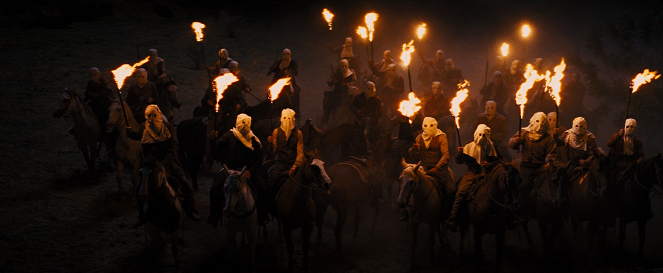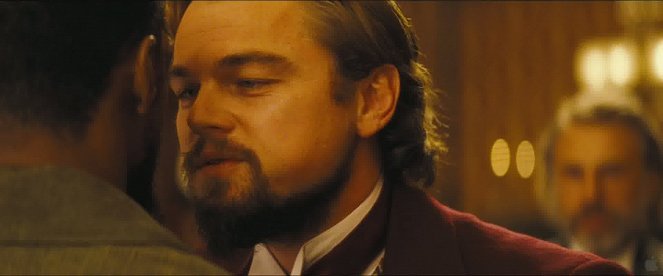Directed by:
Quentin TarantinoScreenplay:
Quentin TarantinoCinematography:
Robert RichardsonCast:
Jamie Foxx, Christoph Waltz, Leonardo DiCaprio, Kerry Washington, Samuel L. Jackson, Walton Goggins, Dennis Christopher, James Remar, David Steen (more)VOD (4)
Plots(1)
Django is a freed slave, who, under the tutelage of a German bounty hunter, becomes a bounty hunter himself. After taking down some bad guys for profit, they track down Django's slave wife and liberate her from an evil plantation owner. (Sony Pictures Home Entertainment)
Videos (42)
Reviews (17)
A little inconsistent, but still the best western for the past god knows how many years. Django Unchained has three parts. The first is an enthralling introduction (the story about Siegfried), again dominated by the absolute genius Christoph Waltz. The second, wordy one, with cultivated dialogues, the amazing candy-muncher DiCaprio, who is surpassed only by Samuel L. Jackson as the (self-proclaimed) “filthiest darn nigger of all times". You can do nothing but revel in his masterfully feigned brown-nosing. The third part, for the most part an action inferno, where blood flows by the gallon, Jamie Foxx steals for himself. Personally I’m not usually his biggest fan, but here he’s perfect, he acts exactly how he’s supposed to and nails the entire development of Django as a person with ease. Camera, editing and direction are almost flawless, as is customary for Tarantino’s movies. The music is just right, mainly the old instrumentals by Ennio and Jerry Goldsmith. One of the movies of the year. Those lyin', goddamn time-wastin' sons of bitches...
()
I was afraid, I don’t like westerns, but I like Tarantino. Fortunately for me, Django Unchained is not even close to a thoroughbred western. It’s just a fun Tarantino movie in the Wild We… South mixed with blaxploitation. After 1200 comments in Filmbooster, it’s hard to come up with something original or interesting to say about Django, so what follows is a couple of personal incoherent rants and observations… The scene with the predecessor of the Ku-Klux-Klan is very funny. The carriage wandering around the American wilderness with a giant model of a tooth on the roof is incredibly cool. Hans Landa can be a nice guy. I wouldn’t like to run into DiCaprio with a hammer. Samuel. L. Jackson is a badass. I liked Inglorious Basterds better :)
()
SPOILERS AHEAD. My second viewing of Django Unchained clarified some seeming structural faults (the triple ending, the ineffectiveness of the romantic storyline), but it still seemed to me that the film has fundamental problems with pacing and cohesion: the continuously changing tone is quite gratuitous, some shots and scenes stick out of the film (the double cameo by Zoe Bell as a woman watching the approaching Django and Schultz from a window and as a gang member). It doesn’t matter that the characters do a lot of talking about things for which a single shot would have sufficed – Tarantino has always been stronger at interior dialogue than narrative images, so we can understand the landscape here as serving a purely decorative purpose. What’s problematic, however, is that some of the dialogue-heavy scenes don’t push the narrative along, nor do they offer any other value added such as slowly built-up tension (which was a major component of Inglourious Basterds). The strangely edited KKK digression after the Brittle brothers are captured (the inserted flashback seems somewhat confusing at first) is nothing more than filler. One storyline concludes, but the next (Hildi) hasn’t yet been opened. The narrative stands still for several minutes. Schultz’s subsequent familiarisation of Django with the rules of the market mechanism initiates the transformation of the slave into a master, which culminates with a radical change of wardrobe. Together with the education in capitalism, however, there is the rather unnecessary (in terms of the narrative, not the viewing experience) training of Django to be the fastest gunslinger in the American south. Despite that, the multi-layered transformation of the protagonist ranks among the best instances of character development in Tarantino’s entire filmography. From the beginning, we are prepared for Django to take over responsibility from his master, toward whom he first behaves like a little boy, eager to learn what has become of his German princess. However, he gradually exhibits more and more independence, though the roles he has to play, which definitely do not suit him, prevent him from fully expressing himself (his microworld has to be subordinated to Schultz’s, with which he later comes into conflict, powerfully for the first time in the scene with the dogs). With all the more bombast in the blaxploitation-style climax, he can take on the position of head moral authority, throw off all masks (and the saddle from his horse) and, as a completely free hard-ass black motherfucker, shoot about two dozen white devils (and one assimilated black man who reveres his master more than his own mother and undergoes a similar shift in meaning in relation to his master as Django does). Finally, Django explicitly sets out to do what Tarantino does behind the camera – break down stereotypes. Most of the characters that the German former dentist and the freed slave encounter correspond to a certain archetype from American mythology or from exploitation cinema (mammy, the Southern belle, the villain obsessed with eugenics). Unfortunately, Hildi is no exception; for Tarantino, she is an unusually one-dimensional female character who is mostly allowed only to cry, scream and be rescued. Django Unchained is an incredibly stylish affair, excellent in many of its constituent parts (soundtrack, actors, punchlines) and bold in its refusal to respect the conventions of westerns (though Italian directors had much earlier violated some of them, e.g. shooting a horse and using white American cowboys as villains), but as a whole, the film is not entirely cohesive. In terms of making an impression, however, it is almost perfect with respect to the intensity of viewing pleasure and I will watch some of its scenes many more times.
()
(less)
(more)
I consider myself a rational man, a person of science, and an admirer of natural laws. I do not believe in water spirits and witches, I smile at the products of astrologers, and I shrug at the belief in prophecies and magic. Occasionally, however, I come across a mystery - something that clearly transcends the boundaries of our world, something that cannot be explained by logic or ordinary thinking processes. I understand why Tarantino made a name for himself with Pulp Fiction. His screenplay cleverly worked with references and pop culture, and it was innovative and funny. But as new titles emerged, the ideas from them disappeared, the effort to be cool turned into awkwardness, quotes turned into copying, and the attempt to meet fans' expectations led to a loss of sanity. However, surprisingly, his success persisted. It's hard to say what the ecstatic admirative comments stem from. Perhaps it's mass suggestion, unknown drugs, or bribes (but in that case, Tarantino shamefully left me out). In the whole movie, I find maybe two funny scenes - the introduction of Christoph Waltz and the encounter with the Ku Klux Klan. The rest is about as funny as the humor of a circus clown from the cheapest provincial circus after a few shots of vodka. The screenplay is unremarkable, relying on poorly written characters, which the director, by the way, doesn't know how to work with. The result is a worn-out, over-stylized, and clichéd film with an excessive runtime. A director like Martin McDonagh knows how to have perspective, playing with genre expectations, and pulp aesthetics in films like In Bruges or Three Billboards Outside Ebbing, Missouri, and overall is several levels above Tarantino. You can interpret Django Unchained however you want, but for me, it's a case of a decently cast, but completely mishandled film. For a long time, I tended to overlook Tarantino's self-centeredness, lack of sanity, and obvious missteps, but now he's getting the full brunt of my dissatisfaction, perhaps even for my previous disappointments. Overall impression: 10%.
()
Anyone expecting a regular spaghetti western will be sorely disappointed. It is more of a typical verbose Tarantino movie with western scenery than a tribute to the genre (or genres) with everything they entail. It was to be expected, but it is still a crying shame, because if anyone, Quentin should have tried to challenge the holy Italian Trinity of Sergios (Leone, Sollima, Corbucci) in their sovereign field. Anyway, it doesn't matter “what it is/isn't“, when it’s such a damn good and stylish movie. Of course, the more you watch it, the more references you notice, but ultimately it doesn't matter if you know which genre classic is referenced by the composition “Für Elise" being played on a harp in the saloon or by the other hundred allusions to this and that; Fans of Monty Python humor will also find something to enjoy in the scene involving the birth pains of a beta version of the Ku Klux Klan… There are only two blemishes. First, the length. It’s too short and therefore in many places inappropriately hurried. And then the finale which lacks a tension-building, face-to-face duel. Which is an unforgivable faux pas, Quentin!
()
Gallery (131)
Photo © The Weinstein Company / Andrew Cooper



Ads